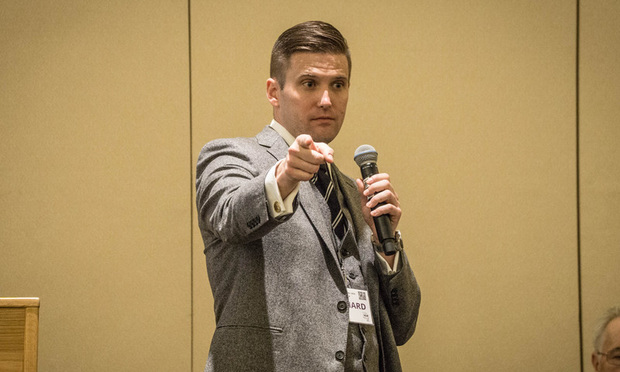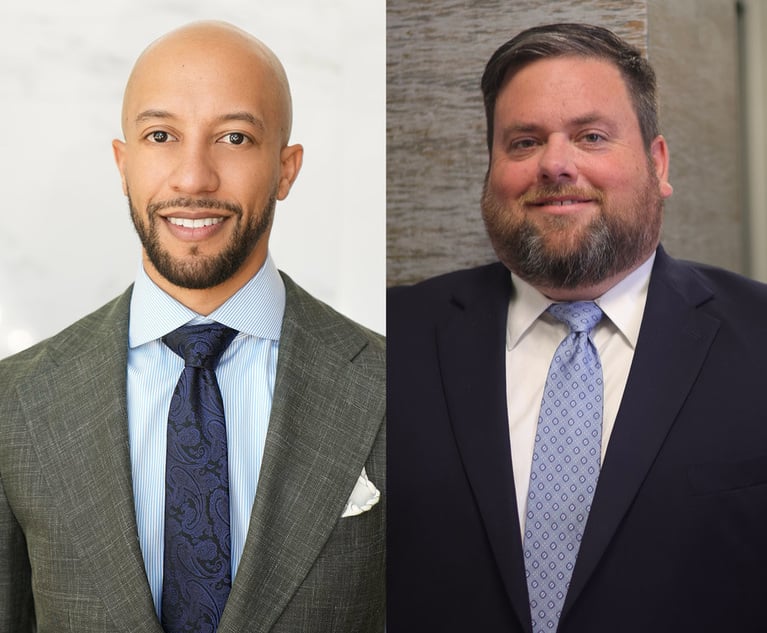Georgia Man Sues Penn State for Barring White Nationalist's Speech
Penn State is the latest to be hit with a free-speech lawsuit after rejecting a request for prominent white nationalist Richard Spencer to speak on campus.
October 24, 2017 at 04:00 PM
4 minute read
 Richard Spencer
Richard Spencer
Pennsylvania State University is the latest to be hit with a free-speech lawsuit after rejecting a request for prominent white nationalist Richard Spencer to speak on campus.
According to the complaint, filed Oct. 19 in the U.S. District Court for the Middle District of Pennsylvania, plaintiff Cameron Padgett, a Georgia man in charge of coordinating Spencer's campus speaking tour, reached out to the university in July attempting to rent a conference room or lecture hall for a speech by Spencer.
The suit names the Penn State Board of Trustees and university president Eric Barron as defendants.
Spencer, the president of the National Policy Institute, was one of the promoters of the “Unite the Right” rally in Charlottesville, Virginia, that turned deadly in August when marchers clashed with protesters.
On Aug. 22, Barron issued a statement on behalf of the university, calling Spencer's views “abhorrent and contradictory to our university's values,” but adding: “After critical assessment by campus police, in consultation with state and federal law enforcement officials, we have determined that Mr. Spencer is not welcome on our campus, as this event at this time presents a major security risk to students, faculty, staff and visitors to campus. It is the likelihood of disruption and violence, not the content, however odious, that drives our decision.”
However, Padgett, in his complaint, alleged the threat of violence was coming solely from the Antifa—short for “antifascist”—movement, directed at Spencer and his supporters.
“Defendants' decision to prohibit plaintiff from renting a conference room or lecture hall on PSU's campus due to violence implicitly or explicitly threatened by Antifa and not by the speaker constitutes unconstitutional content discrimination in the form of a heckler's veto,” Padgett said in the complaint.
Penn State is not the first university to scuttle Padgett's efforts to book a Spencer speech. Nor is it the first to face a free-speech challenge from Padgett.
Texas A&M University, the University of Florida and Auburn University are among those that rejected requests to host Spencer on their campuses. But a federal judge in Alabama issued a preliminary injunction ordering Auburn to allow Spencer to rent a room on campus for his speech—and to pay for security—and the University of Florida ultimately made its own decision to relent, saying it was legally obligated to let Spencer speak.
In his complaint, Padgett said the current situation at Penn State is “virtually identical” to the situation at Auburn.
“Just like Auburn University, the PSU defendants of the instant civil action must permit plaintiff to rent a conference room or lecture hall for Spencer to speak about alt-right philosophy on PSU's campus if the First and Fourteenth amendments to the United States Constitution are to be respected,” the complaint said, adding that “this court can and should issue preliminary and permanent injunctions against defendants whereby defendants are ordered to permit plaintiff to rent a conference room or lecture hall on the campus of PSU for a fee to host Spencer as a speaker without plaintiff paying for police protection or posting bond or providing insurance for the event and which requires PSU to maintain law and order via the use of law enforcement officers of its police department so as to protect Spencer's right to safely speak in a meaningful manner.”
The suit alleges First and 14th amendment free-speech violations and also includes a claim for punitive damages “because defendants caused harm to plaintiff that was malicious, oppressive, and/or in reckless disregard of plaintiff's rights.”
Padgett's attorney, Jordan Rushie of Rushie Law in Philadelphia, noting the protests that occurred during Spencer's speech at the University of Florida on Oct. 19. said Penn State is doing a disservice to its students by denying those who disagree with Spencer the opportunity to express themselves.
“The First Amendment exists to protect speech that people don't necessarily like, agree with, [or that they] find offensive or even hateful,” Rushie said.
A spokesperson for Penn State said it was the university's policy not to comment on pending litigation.
Zack Needles can be contacted at 215-557-2373 or [email protected]. Follow him on Twitter @ZackNeedlesTLI.
This content has been archived. It is available through our partners, LexisNexis® and Bloomberg Law.
To view this content, please continue to their sites.
Not a Lexis Subscriber?
Subscribe Now
Not a Bloomberg Law Subscriber?
Subscribe Now
NOT FOR REPRINT
© 2025 ALM Global, LLC, All Rights Reserved. Request academic re-use from www.copyright.com. All other uses, submit a request to [email protected]. For more information visit Asset & Logo Licensing.
You Might Like
View All
Veteran Litigators Move From Sidley Austin to Alston & Bird's New Chicago Office
3 minute read
'Pushed Into Oncoming Traffic': $5.85M Settlement in Mediated Auto Tort
6 minute read
Justice Known for Asking 'Tough Questions' Resolves to Improve Civility
4 minute read
'Nerve-Wracking': Fires Disrupting but Not Halting Work of Distributed Firms' LA Lawyers
3 minute readTrending Stories
- 1'There's Always More to Be Done': Former US Attorney Breon Peace Reflects on Series of Firsts at EDNY
- 2Former Thomas Clerk Sarah Harris to Serve as Acting Solicitor General
- 3Coral Gables Firm Secures $26M Settlement
- 4Trump's Second Term Spurs Unusual Alliances Between US and European Law Firms
- 5Honored by NYSBA, 2nd Circuit Chief Judge Livingston's Remarks Stress Judicial Safety
Who Got The Work
J. Brugh Lower of Gibbons has entered an appearance for industrial equipment supplier Devco Corporation in a pending trademark infringement lawsuit. The suit, accusing the defendant of selling knock-off Graco products, was filed Dec. 18 in New Jersey District Court by Rivkin Radler on behalf of Graco Inc. and Graco Minnesota. The case, assigned to U.S. District Judge Zahid N. Quraishi, is 3:24-cv-11294, Graco Inc. et al v. Devco Corporation.
Who Got The Work
Rebecca Maller-Stein and Kent A. Yalowitz of Arnold & Porter Kaye Scholer have entered their appearances for Hanaco Venture Capital and its executives, Lior Prosor and David Frankel, in a pending securities lawsuit. The action, filed on Dec. 24 in New York Southern District Court by Zell, Aron & Co. on behalf of Goldeneye Advisors, accuses the defendants of negligently and fraudulently managing the plaintiff's $1 million investment. The case, assigned to U.S. District Judge Vernon S. Broderick, is 1:24-cv-09918, Goldeneye Advisors, LLC v. Hanaco Venture Capital, Ltd. et al.
Who Got The Work
Attorneys from A&O Shearman has stepped in as defense counsel for Toronto-Dominion Bank and other defendants in a pending securities class action. The suit, filed Dec. 11 in New York Southern District Court by Bleichmar Fonti & Auld, accuses the defendants of concealing the bank's 'pervasive' deficiencies in regards to its compliance with the Bank Secrecy Act and the quality of its anti-money laundering controls. The case, assigned to U.S. District Judge Arun Subramanian, is 1:24-cv-09445, Gonzalez v. The Toronto-Dominion Bank et al.
Who Got The Work
Crown Castle International, a Pennsylvania company providing shared communications infrastructure, has turned to Luke D. Wolf of Gordon Rees Scully Mansukhani to fend off a pending breach-of-contract lawsuit. The court action, filed Nov. 25 in Michigan Eastern District Court by Hooper Hathaway PC on behalf of The Town Residences LLC, accuses Crown Castle of failing to transfer approximately $30,000 in utility payments from T-Mobile in breach of a roof-top lease and assignment agreement. The case, assigned to U.S. District Judge Susan K. Declercq, is 2:24-cv-13131, The Town Residences LLC v. T-Mobile US, Inc. et al.
Who Got The Work
Wilfred P. Coronato and Daniel M. Schwartz of McCarter & English have stepped in as defense counsel to Electrolux Home Products Inc. in a pending product liability lawsuit. The court action, filed Nov. 26 in New York Eastern District Court by Poulos Lopiccolo PC and Nagel Rice LLP on behalf of David Stern, alleges that the defendant's refrigerators’ drawers and shelving repeatedly break and fall apart within months after purchase. The case, assigned to U.S. District Judge Joan M. Azrack, is 2:24-cv-08204, Stern v. Electrolux Home Products, Inc.
Featured Firms
Law Offices of Gary Martin Hays & Associates, P.C.
(470) 294-1674
Law Offices of Mark E. Salomone
(857) 444-6468
Smith & Hassler
(713) 739-1250






